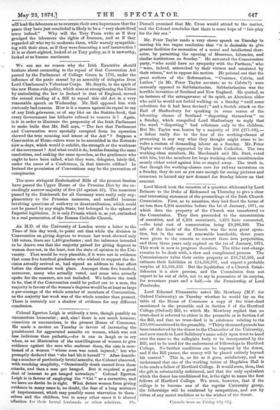We can see no reason why the Irish Executive should
hesitate about consenting to the repeal of that Convention Act passed by .the Parliament of College Green in 1793, under the influence of the panic caused by an assembly of delegates from Lord Charlemont's Volunteer Corps. Mr. Smyth, in the spirit of the new Home-rule policy, which aims at strengthenin,g the Union by assimilating the law in Ireland to that of England, moved the second reading of a Bill to repeal this old Act in a very reasonable speech on Wednesday. Mr. Ball opposed him with curiously badreasons. How is it a reason against its repeal to say of any Irish grievance, or of any blot on the Statute-book, that -every Government has hitherto refused to remove it ? Again, is it in order to illustrate the propensity of the Irish Parliament to make bulls that Mr. Ball says, "The fact that Parliament and Convocation were specially excepted 'from its operation -showed the true meaning and intent of the Act " ? Suppose a Convention of Home-rulers were to be assembled in the Rotondo aiaw-a-days, which would it exhibit, the strength or the weakness -of the movement ? And what could it do, besides framing the same resolutions, and making the same speeches, as the gentlemen who ought to have been called, what they were, delegates, lately 'did, under the name of a Conference, in that historic edifice? In Ireland the permission of Conventions may be the prevention of -conspiracies.


































 Previous page
Previous page